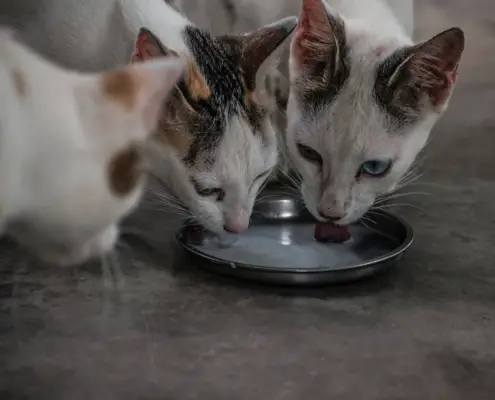
Feline fever is a condition that affects cats and can cause them to become sick. Many cat owners wonder if their feline companions can actually get sick and experience fever. The answer is yes, cats can indeed develop a fever. This article will explore the truth behind feline fever, including its causes, symptoms, diagnosis, treatment, and prevention.
Understanding the Feline Immune System
To understand how cats can get sick and develop a fever, it is important to have a basic understanding of the feline immune system. Cats, like humans, have an immune system that helps protect them against various diseases and infections. However, their immune system may not always function optimally, making them susceptible to illnesses and fevers.
The feline immune system consists of various components, including white blood cells, antibodies, and lymphoid tissues. These components work together to identify and eliminate harmful pathogens that enter the cat’s body. When the immune system detects a potential threat, it triggers an inflammatory response, which can result in fever as a protective mechanism.
Common Symptoms of Fever in Cats
Recognizing the symptoms of fever in cats is crucial for early detection and appropriate treatment. While cats cannot verbally express their discomfort, there are several signs that can indicate the presence of fever. These symptoms may include:
- Elevated body temperature: One of the most obvious signs of fever in cats is an increase in body temperature. A normal cat’s temperature ranges between 100.5 to 102.5 degrees Fahrenheit, and anything above this range indicates a fever.
- Lethargy: Cats with fever often exhibit a lack of energy and enthusiasm. They may appear tired, less active, and unwilling to engage in their usual activities.
- Loss of appetite: Fever can affect a cat’s appetite, leading to a decreased interest in food and water. If your cat refuses to eat or drink for an extended period, it may be a cause for concern.
- Shivering or trembling: Similar to humans, cats with fever may experience shivering or trembling as their body tries to regulate its temperature.
- Nasal discharge: Some cats may develop a runny nose or sneezing when they have a fever. This can be a sign of an underlying infection that needs to be addressed.
Causes of Fever in Cats
Several factors can contribute to the development of fever in cats. The most common cause is an underlying infection, which can be bacterial, viral, or fungal in nature. Infections such as upper respiratory infections, urinary tract infections, and dental infections can all lead to fever in cats.
Other potential causes of fever include:
- Inflammatory conditions: Cats can develop fever as a result of various inflammatory conditions, such as pancreatitis or inflammatory bowel disease.
- Toxicity: Exposure to certain toxins or medications can cause fever in cats. It is important to keep household chemicals and medications out of reach of your feline companion.
- Immune system disorders: Autoimmune diseases or disorders that affect the immune system can disrupt its normal functioning, leading to fever in cats.
- Cancer: In some cases, fever can be a symptom of an underlying cancerous condition. If your cat has a persistent fever without an apparent cause, it is important to consult with a veterinarian to rule out any serious underlying conditions.
Understanding the underlying cause of your cat’s fever is essential in determining the appropriate treatment and management plan.
When to Be Concerned About Your Cat’s Fever
While fever in cats is relatively common and often resolves on its own, there are instances when it is necessary to be concerned and seek veterinary attention. If your cat’s fever is accompanied by severe symptoms such as difficulty breathing, seizures, or a sudden change in behavior, it is important to consult a veterinarian immediately.
Additionally, if your cat’s fever persists for more than 24-48 hours or if it is accompanied by other concerning symptoms such as vomiting, diarrhea, or significant weight loss, prompt medical attention is warranted. These signs may indicate an underlying condition that requires proper diagnosis and treatment.
Diagnosing Fever in Cats
When you suspect that your cat has a fever, it is crucial to consult with a veterinarian for a proper diagnosis. The veterinarian will perform a thorough physical examination of your cat and may recommend additional diagnostic tests to identify the underlying cause of the fever.
These diagnostic tests may include:
- Blood tests: Blood tests can provide valuable information about your cat’s overall health, including the presence of any infections or abnormalities that may be causing the fever.
- Urinalysis: A urine sample may be collected to check for any signs of urinary tract infection or other related conditions.
- Imaging: In some cases, imaging techniques such as X-rays or ultrasound may be necessary to assess the internal organs and identify any abnormalities.
Based on the results of these diagnostic tests, the veterinarian will be able to provide an accurate diagnosis and recommend appropriate treatment options.
Treating Fever in Cats
The treatment of fever in cats typically involves addressing the underlying cause while providing supportive care to alleviate the discomfort and reduce the fever itself. If an infection is identified as the cause, the veterinarian may prescribe antibiotics or antiviral medications, depending on the specific pathogen involved.
In addition to medication, other treatment measures may include:
- Fluid therapy: Cats with fever may become dehydrated, so providing them with fluids is crucial. In some cases, intravenous fluids may be administered to ensure proper hydration.
- Temperature regulation: To help lower the cat’s body temperature, cooling measures such as damp towels or fans may be used under veterinary supervision.
- Rest and comfort: Providing a quiet and comfortable environment for your cat to rest is essential for their recovery. Ensure they have access to fresh water, clean litter boxes, and a cozy place to sleep.
It is important to follow the veterinarian’s instructions regarding medication administration and follow-up appointments to monitor your cat’s progress.
Preventing Fever in Cats
While it may not be possible to prevent all cases of fever in cats, there are measures you can take to reduce the risk and keep your feline companion healthy. Here are some preventive strategies:
- Vaccinations: Keeping your cat up to date with their vaccinations can help protect them from various infectious diseases that can lead to fever.
- Regular veterinary check-ups: Routine visits to the veterinarian can help detect any underlying health issues early on, allowing for timely intervention and prevention of complications.
- Proper hygiene: Keeping your cat’s living environment clean and practicing good hygiene can minimize their exposure to pathogens that can cause fever. Regularly cleaning litter boxes, washing food and water bowls, and maintaining a clean living space are essential.
- Parasite control: Regularly administering preventive medications for fleas, ticks, and internal parasites can help reduce the risk of infections that may lead to fever.
By implementing these preventive measures, you can significantly reduce the chances of your cat developing a fever and other associated health problems.
Debunking Common Myths About Cats and Fever
There are several misconceptions surrounding cats and fever that need to be addressed. One common myth is that cats cannot get sick or experience fever. As discussed earlier, cats are susceptible to various illnesses, including fever.
Another myth is that fever in cats will always resolve on its own and does not require medical attention. While some cases of fever may indeed resolve without intervention, it is important to consult with a veterinarian to determine the underlying cause and appropriate treatment.
Conclusion
In conclusion, cats can indeed get sick and experience fever. Understanding the feline immune system, recognizing the symptoms of fever, diagnosing the underlying cause, and providing appropriate treatment are all essential in managing this condition. By following preventive measures and seeking veterinary attention when necessary, you can help keep your feline companion healthy and minimize the risk of fever and associated complications. Remember, your cat’s well-being is in your hands, so prioritize their health and provide them with the care they deserve.
If you enjoyed my article, I would appreciate you sharing it with your network.

Sima Ndlebe
Sima writes for CatBuzz. He is interested in Cats, Health and Fitness, and Entrepreneurship.
Published: 30 October 2023
Related Articles
Disclaimer
The content found on CatBuzz.org is presented on an "as is" basis and is intended for general consumer information and education purposes only. Any utilization of this information is voluntary and solely at the user's own risk.
None of the articles or content should be regarded as, or used in place of, veterinary medical advice, diagnosis, or treatment. The information provided on the website is purely for educational and informational intentions and should not be considered a substitute for professional guidance from a veterinarian or other qualified expert. The articles are designed to inform consumers about veterinary healthcare and medical matters that may impact their cat's daily life. It should be noted that this website and its services do not constitute the practice of any form of veterinary medical advice, diagnosis, or treatment. CatBuzz.org explicitly disclaims any liability for any direct or indirect damages or losses that may arise from the use of or reliance on the information contained within the content.
Consumers must consult a veterinarian, veterinary specialist, or another qualified veterinary healthcare provider when seeking advice regarding their cat's health or medical conditions. It is important not to ignore, avoid, or postpone seeking medical advice from a veterinarian or other qualified veterinary healthcare provider solely based on information obtained from this website. If you believe that your cat may be experiencing a medical issue or condition, it is imperative to promptly contact a qualified veterinary healthcare professional.



